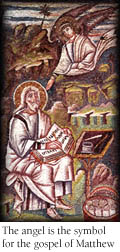The Gospel of Matthew
Writing for a Jewish Christian audience, Matthew's main concern is to present Jesus as a teacher even greater than Moses.by Marilyn Mellowes
 The evangelist who composed the gospel of Matthew was probably a Jewish
Christian, possibly a scribe. The historical evidence suggests that he wrote
between 80 and 90 CE and addressed his work to a community in conflict:
Jewish Christians who were being pushed out of the larger communities, located
in northern Galilee or Syria. These communities were led by Pharisees, rabbis
who assumed leadership of the Jewish people in the aftermath of the destruction
of Jerusalem.
The evangelist who composed the gospel of Matthew was probably a Jewish
Christian, possibly a scribe. The historical evidence suggests that he wrote
between 80 and 90 CE and addressed his work to a community in conflict:
Jewish Christians who were being pushed out of the larger communities, located
in northern Galilee or Syria. These communities were led by Pharisees, rabbis
who assumed leadership of the Jewish people in the aftermath of the destruction
of Jerusalem.
Matthew is at pains to place his community squarely within its Jewish heritage, and to portray a Jesus whose Jewish identity is beyond doubt. He begins by tracing Jesus' genealogy. To do this, Matthew only needed to show that Jesus was a descendent of King David. But Matthew takes no chances. He traces Jesus' lineage all the way back to Abraham. In the words of Helmut Koester, "It is very important for Matthew that Jesus is the son of Abraham." In short, Jesus is a Jew.
Matthew grounds his entire work in the traditions of Judaism. Matthew's narrative includes most of Mark's gospel but is supplemented with sayings material, another written source known as "M," and possibly other material as well. But even through the evangelist includes miracle stories, his main concern is to present Jesus as a teacher even greater than Moses. Accordingly, Matthew uses his sources to create a somewhat different narrative in which Jesus repeated instructs the people.
In Matthew's gospel, Jesus delivers five major speeches, which parallel the five great books of Moses known as the Pentateuch. The first and most important of Jesus' speeches is the Sermon on the Mount. One of the intriguing characteristics of this address is Jesus' repetition of the words, "you have heard it said . . . But I say to you." Matthew is giving a new interpretation to the Law; he is establishing the church as the new Israel. Matthew's concern about the state of the church is reflected in the way he tells the story of Jesus stilling the storm. In Greek, the word "storm" actually means earthquake. According to one interpretation, this story is really a metaphor: the disciples represent the Christian community, the boat is the church. In the face of upheaval and uncertainty that challenges faith and threatens to undo the church, Jesus gives assurance to the faithful: "Behold, I am with you until the end of days."
Matthew's community subscribed to the Law, but they saw Jesus -- not the Pharisees -- as the rightful interpreter of the Law. This conviction tended to undermine the legitimacy and authority of the Pharisees who criticized the followers of Jesus. Now Matthew makes the Pharisees the "hypocrites": "Woe to you scribes and Pharisees, hypocrites. For you are like white washed tombs which on the outside look beautiful but inside they are full of the bones of the dead and all kinds of filth." (MATT 23:27)
Matthew's attitude toward the Pharisees is reflected in the way he tells the story of the death of Jesus. Pontius Pilate is portrayed as a sympathetic figure, and the blame is squarely placed on the Jewish leaders. But the fact that Jesus is pronounced dead leaves the Pharisees still worried. Jesus had predicted that "After three days I will rise again." (MATT 27:63). They imagine a scenario in which the followers of Jesus steal his body from the tomb in order to vindicate his claims. Pilate suggests that they seal the tomb with a large stone.
Now Matthew refashions the final scene of Mark's story. The women come to the tomb and discover that Jesus is gone. But this time the angel instructs them to tell the disciples that he has risen. Then Jesus himself appears before the women and directs them to tell the disciples to meet him in Galilee. The disciples go the mountain -- just as Jesus himself had once ascended the mountain to deliver the Sermon on the Mount -- and they encounter Jesus. But some of them have doubts. Is it really him? Jesus reassures them: "All power is given unto me in heaven and in earth." And he also instructs them: "Go therefore and teach all Nations, baptizing them in the name of the Father, of the Son, and of the Holy Ghost."
Notice that Jesus does not tell the disciples to only go only to "Israel" or to the "lost sheep of the house of Israel." He tells them to go to "the Nations" -- to all peoples. For the Kingdom which Jesus has promised will embrace both Jew and gentile alike.
